
Rethink Waste is Gonzaga’s campaign to reduce waste on campus and in the community. It is supported by Gonzaga’s Environmental Organization and the Office of Sustainability.
This page provides details about waste reduction efforts on campus.
For more information about waste on campus please visit @rethinkwastegonzaga or @zagsgogreen on Instagram.
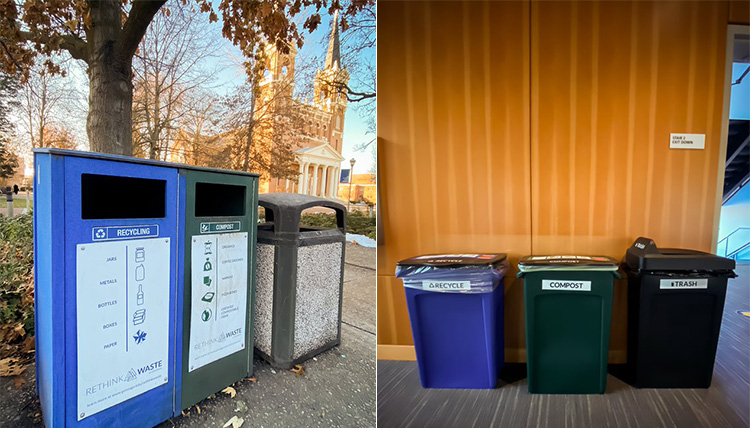
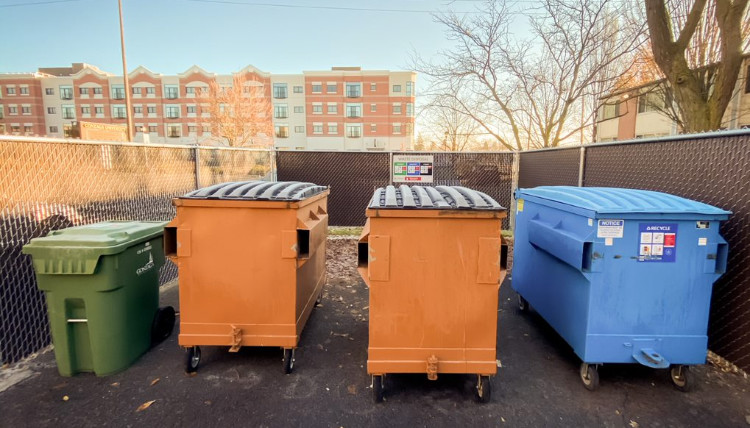
Compost
- All food scraps
- Dirty pizza boxes
- Certified compostable utensils and dishware
- Paper bowls and boats from the COG
- White and green paper cups from the COG
- Coffee grounds and filters
- Tea bags (remove staples)
- Soiled paper products (napkins, paper, etc.)
- Soiled coffee sleeves
- Soiled drink carriers
- Straws (make sure the wrapping says “compostable”)
- Wooden coffee stirrers
- Qdoba bowls
- Cotton balls and Q-tips
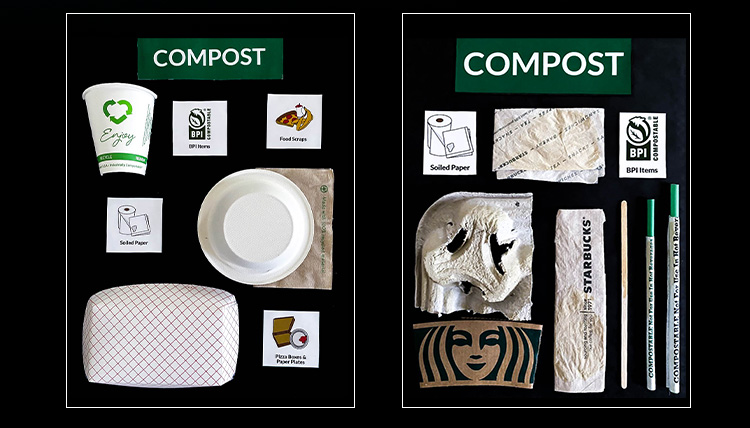
Recycling
- Clean cold cups
- Clean coffee sleeves
- Clean plastic and glass bottles/jugs (no lids)
- Clean plastic salad containers
- Thomas Hammer reusable aluminum straws
- Paper (not shredded)
- Aluminum and tin cans
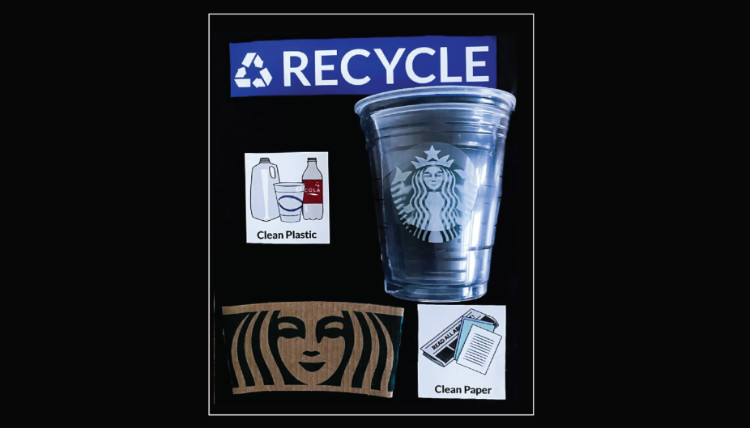
Trash
- Coated cartons (shelf-stable milks, Tetra packs, etc.)
- Foil seals (found on yogurt, fruit cups, etc.)
- Bottle lids and caps
- Coffee cup lids (both hot and cold)
- Hot coffee cups
- Coffee cup stoppers
- Starbucks pastry bags
- Shredded paper
- Paper products with a shiny or waxy layer
- Plastic utensils and straws
- Receipts
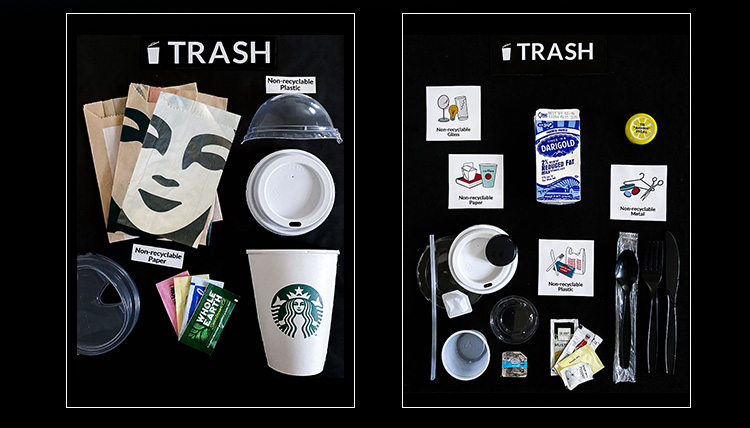
Employees can request small recycling bins for their offices, or the 3-stream set of recycling, compost, and trash bins from Plant Services at customerservice@plant.gonzaga.edu.
Gonzaga and the City of Spokane use single-stream recycling! Any recyclable item from the list below can be placed in any of the recycling bins on campus. All objects must be clean and emptied before recycling.
Paper
- Newspaper
- Printing Paper
- Notebook Paper
- Sticky Notes
- Magazines
- Advertisements found in the newspaper
- Flattened cardboard and cereal-like boxes (broken down with all plastic or tape removed)
Plastic
(All plastic numbers are now accepted, these numbers (1-7) can be found on the bottom of the item inside the recycling symbol)
** All lids and caps for cold coffee cups, bottles, jars, and tubs go in the trash
- Clean bottles
- Clean jars
- Clean cold coffee cups
- Clean tubs (think yogurt!)
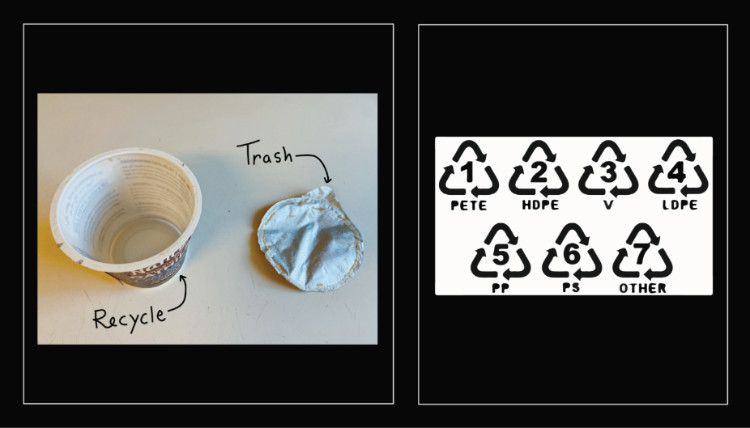
Glass
- Clean bottles
- Clean jars
Metal
- Clean aluminum and steel cans
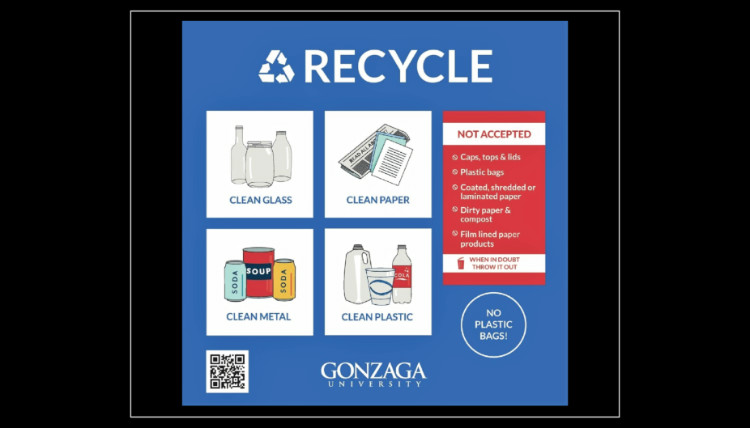
Helpful Tips for Recycling
- Never keep recycling in bags – keep it loose!
- “Wish-cycling” can result in entire batches of acceptable recyclables being sent to the landfill. Recycle items that you are positive are accepted!
- Try using your own reusable items to avoid having to produce waste. (Reusable bags, coffee mugs, utensils, tupperware containers, etc.)
“When in doubt, throw it out!” If you’re unsure of where to put an item throw it out. Items are better off going to the landfill than becoming a possible contaminant in the compost or recycling streams.
Non-Accepted Paper
- Dirty paper towels (compost these)
- Napkins and non-coated paper plates (compost these)
- Tyvek Envelopes
Non-Accepted Plastics
- All plastic bags
- Plastic clamshell containers and deli trays
- Plastic plates and utensils
- Prescription vials
- Styrofoam
- Crinkly and flimsy plastics (think plastic that wraps paper products)
Non-Accepted Glass
- Ceramics
- Broken glass
- Dishes
- Drinking glasses
- Windows
- Mirrors
Non-Accepted Aluminum + Metal
- Sharp metal
- Greasy items
- Dirty aluminum
- Clothing hangers
Other Non-Acceptable Items
- Clothing, Shoes (donate these)
- Electronics (see IT in downstairs Foley)
- Fluorescent bulbs and tubes (recycling options takeitbacknetwork.org)
- Hoses
- Needles, Syringes (disposal options: medwastewm.com)
- Toxic Containers (pesticides, antifreeze, paint, oil, etc.)
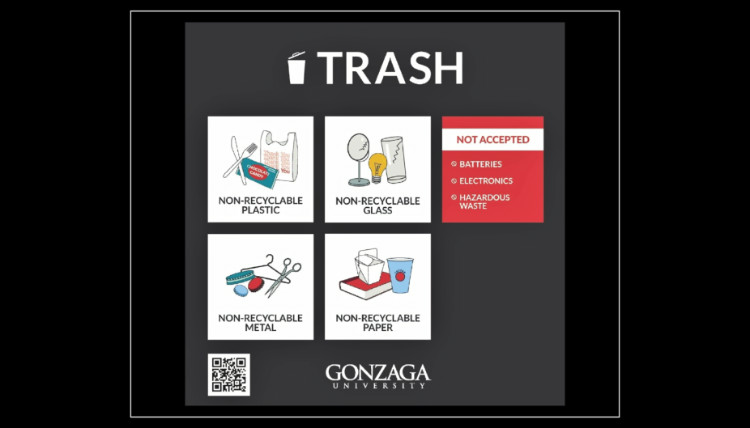
Helpful Tips for Trash
- Crinkly and flimsy plastics are not recyclable and should be placed in the trash (chip bags, plastic bags, granola bar wrappers, yogurt foil lids, etc.).
- Remove and throw away plastic wrapping and labeling from recyclables before recycling – this increases the odds of that item being recycled.
- Never throw away or put batteries in normal blue bins - recycling containers for batteries can be found across campus.
Compost is decomposed organic material, made up of natural decaying items like food scraps, dirty paper, and yard debris. These materials are important because through the decomposition they will turn into beneficial and nutrient rich soil that helps to grow fruitful plants. However, composted materials do not readily decompose in landfills because of the lack of oxygen from decompression and methane released through incineration is extremely harmful. Avoiding contamination and composting correctly reduces pressure on landfills, and helps return nutrients to life-sustaining soils!
Organics
- Meat
- Poultry
- Fish
- Beans
- Dairy products
- Fruit
- Vegetables
- Breads
- Grains
- Pastas
- Eggshell
- Eggshells and nutshells
- Coffee grounds and filters
- Tea bags (remove staples)
Dirty Paper
- Greasy pizza delivery boxes
- Certified compostable items (most catering items by ZagDining are compostable!)
- Paper towels
- Napkins
- Paper cartons (from eggs, berries, etc.)
- Uncoated paper plates and cups (make sure there is no shiny layer that squeaks when rubbed)
- Paper grocery bags with food scraps
Yard Debris
**No rocks
- Grass
- Leaves
- Weeds
- Pine needles
- Pinecones
- Thatch
- Vines
- Plant trimmings
- Small amounts of sod
- Branches less than 3" in diameter
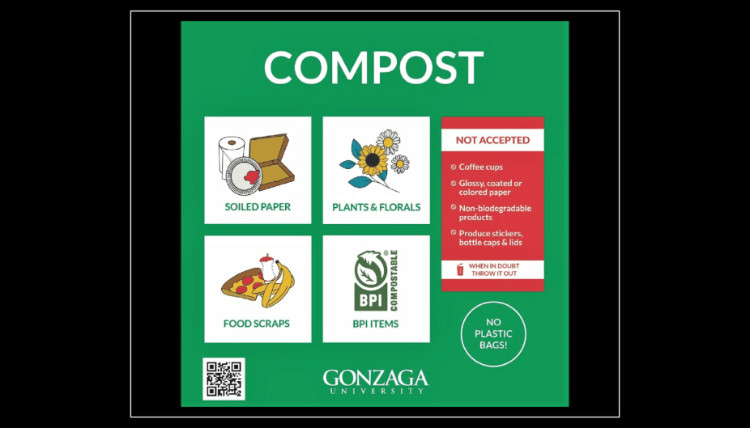
Helpful Tips for Compost
- Dirty paper products and dirty cardboard should be composted. The contaminants of these items interrupt the recycling process and can ruin the entire batch of recyclable paper products.
- If a paper product doesn't have a clean tear, has a glossy sheen or makes a squeaking noise when you rub your finger across the surface, this is a sign that it is lined with plastic and cannot be composted.
- Don’t forget to remove stickers from fruits before composting!
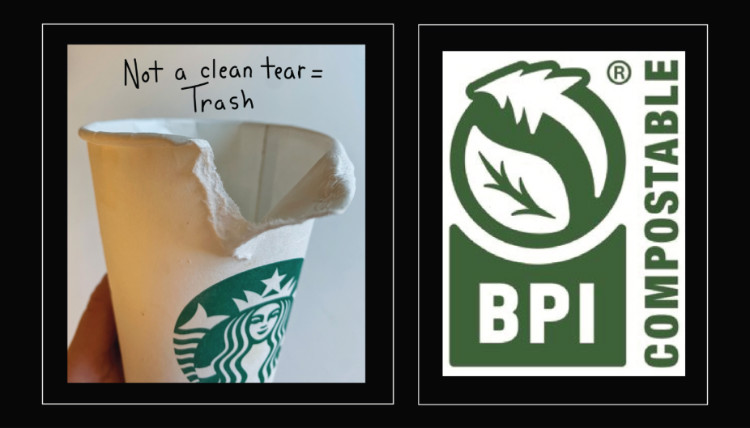
You can also check if an item is compostable by visiting https://products.bpiworld.org/.
Waste Justice
Rethink Waste is dedicated to educating and facilitating change regarding environmental justice. Waste sites and pollution continue to perpetuate the oppression of Black, Indigenous, and People of Color (BIPOC). We believe it is our duty to create a cleaner and more just society for everyone. Please read below for more information on how waste disproportionately affects BIPOC communities.
- 3 out of 5 Black individuals live in a community with at least one abandoned waste site.
- 56% of residents in a neighborhood with a waste site are BIPOC.
- Black individuals are 79% more likely than white individuals to live in an area where industrial pollution is the greatest health risk.
- Communities of color have disproportionately high rates of endocrine-disrupting chemicals due to toxic waste and air pollution.
- Water contamination has largely affected children of color who live in rural areas, indigenous communities, and migrant farmworker communities.
